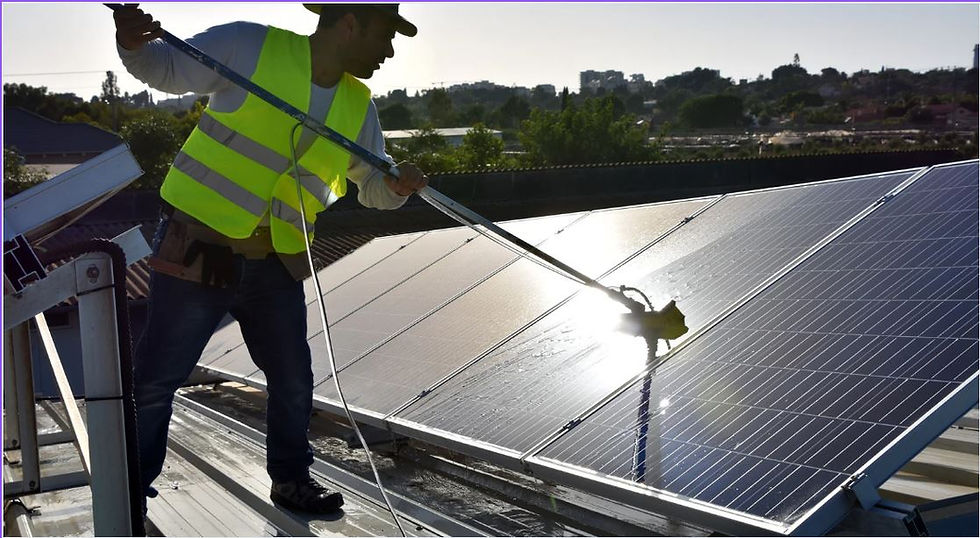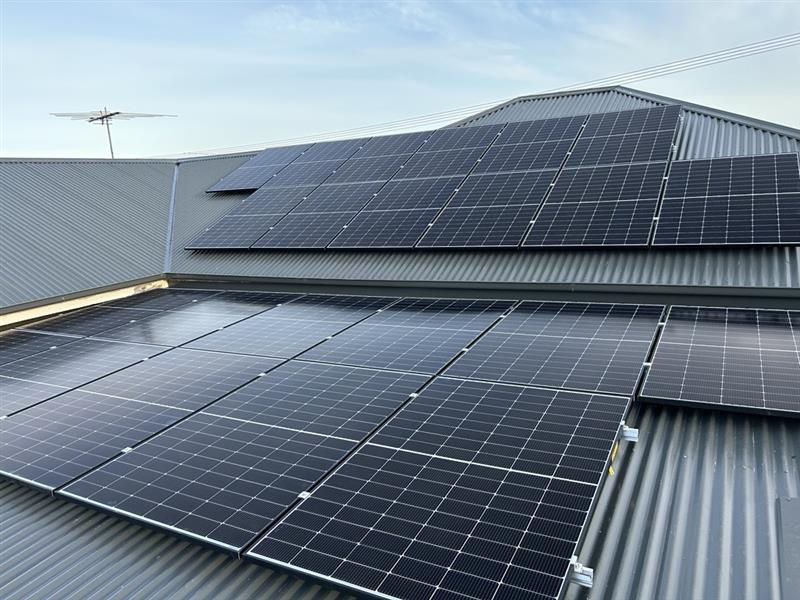The Link Between Clean Panels and Higher Power Output: When to Act
- Marketing AR Energy
- Aug 18
- 3 min read
If you’re one of the millions of Australians who’ve embraced rooftop solar, you already know the benefits: lower energy bills, reduced reliance on the grid, and a greener lifestyle. But here’s something many homeowners overlook—the performance of your solar system is directly linked to how clean your panels are.

Australia’s climate, with its mix of long dry spells, coastal salt, dust storms, and seasonal pollen, means solar panels don’t stay spotless for long. Even a thin layer of dust or bird droppings can block sunlight, reducing the amount of power your system generates. Over time, this adds up to higher electricity bills and wasted solar potential.
How Dirt Affects Solar Panel Efficiency
Solar panels work by capturing sunlight through photovoltaic (PV) cells. When those cells are partially shaded—whether by dust, grime, or leaves—the amount of light converted into usable energy decreases.
According to the Australian Energy Council, rooftop solar contributed about 15% of the National Electricity Market’s total power in Q1 2025, growing 14% year-on-year. That growth shows how crucial solar is becoming to the country’s energy mix. But it also highlights why every homeowner needs their system performing at its best.
A dirty panel might not seem like a big deal, but across thousands of households, it can mean significant lost energy.
For example, studies show that panels with heavy dust buildup can lose up to 20% of their efficiency. That’s like paying for a 6.6kW system and only getting the output of a 5kW system.
The Financial Impact on Energy Bills
When your panels aren’t operating efficiently, your home draws more electricity from the grid. In practical terms, that means higher bills—especially during high-usage seasons like summer in Adelaide or Perth when air conditioning is running daily.
Let’s put it simply:
Clean panels = more free solar power = less grid electricity used.
Dirty panels = reduced output = more money spent on energy bills.
For the average Australian household, that difference could mean hundreds of dollars per year. Over the lifespan of your solar system, neglecting maintenance can cost you thousands.
When Should You Act?
Knowing when to clean or maintain your panels can feel tricky, but there are some clear signs and guidelines:
1. Visible Dirt or Debris
If you notice dust, bird droppings, or leaves stuck on your panels, it’s time to act. Even small shaded areas can reduce the efficiency of your entire system.
2. Unexpectedly High Energy Bills
If your bills are creeping up even though your energy use hasn’t changed, dirty or underperforming panels might be the culprit.
3. Seasonal Factors
After bushfire season: Ash and soot can stick to panels.
During spring: Pollen and tree debris often accumulate.
In coastal areas: Salt spray can form a thin, sticky film on glass.
4. Every 6–12 Months
As a general rule, solar experts recommend cleaning panels at least once or twice a year in most parts of Australia. In dust-prone regions, more frequent care may be needed.
How to Clean Your Solar Panels Safely
While some homeowners attempt DIY cleaning, safety should always come first. Roof access can be risky, and using the wrong cleaning tools may damage your panels.
Here are a few safe options:
Hire a professional: A solar maintenance specialist in Adelaide has the right equipment and knows how to clean without causing damage.
Low-pressure hose & soft brush: If you choose DIY, avoid harsh chemicals and high-pressure washers.
Schedule checks with maintenance: Many solar companies offer regular servicing packages that include cleaning and performance testing.
Beyond Cleaning: Full Solar Maintenance
Cleaning is just one part of keeping your solar system in top shape. Regular maintenance also includes:
Checking the inverter for error messages.
Inspecting for loose wiring or corrosion.
Monitoring system performance through apps or energy reports.
Think of it like servicing your car—you wouldn’t drive for years without a check-up, so don’t let your solar system go unchecked either.
The Long-Term Benefits of Staying Proactive
Regular cleaning and maintenance give you:
Maximum energy efficiency year-round.
Lower power bills thanks to optimal solar production.
Extended system lifespan, protecting your investment.
Peace of mind knowing your household is running on clean, reliable power.
By keeping your panels clean, you’re ensuring that your solar system delivers what you paid for—and continues to do so for decades.
Conclusion:
Solar is one of the smartest investments Australian homeowners can make—but like any investment, it requires upkeep. The link between clean panels and higher power output is clear: regular action keeps your system efficient, your bills low, and your home powered by the sun’s full potential.
So don’t wait until your bills creep up. Schedule a panel check or cleaning today, and enjoy the true benefits of clean, green energy.







Comments